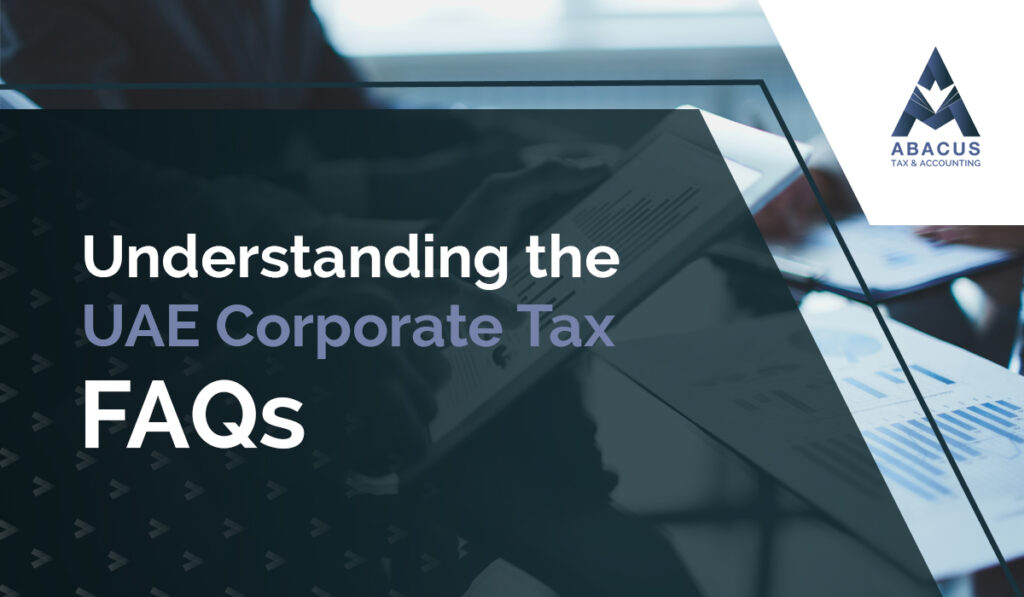
The introduction of Corporate Tax in the UAE has brought about significant changes to the tax landscape for businesses, necessitating a thorough understanding and careful navigation of compliance requirements and other Corporate Tax considerations. This blog aims to address frequently asked questions (FAQs) to enhance understanding of Corporate Tax in the UAE. We will delve into various key aspects of the Corporate Tax regime to assist businesses in comprehending and managing their Corporate Tax responsibilities in the UAE. Let us now proceed to the questions and their respective answers.
Corporate Tax UAE Frequently Asked Questions Answered
1. What is Corporate Tax?
In simple terms, “Corporate Tax” refers to a type of tax imposed on the profits of companies or corporations. It is the tax that businesses pay on their income after deducting allowable expenses and deductions. Corporate tax plays a crucial role in a country’s tax structure and has significant implications for the overall economy.
2. How does the implementation of Corporate Tax in the UAE impact businesses?
The introduction of Corporate Tax in the UAE has various implications for businesses. It entails compliance with registration and filing requirements similar to VAT. However, levying Corporate Tax on business profits also results in increased costs.
3. How can businesses assess their Corporate Tax obligations under the new policy?
Businesses need to evaluate their Corporate Tax obligations by considering the provisions applicable to their specific category based on revenue thresholds. Additionally, they should assess these provisions in relation to their legal status and other aspects of their business.
4. What are the compliance requirements for businesses concerning Corporate Tax?
Apart from adhering to other applicable rules, businesses must register for Corporate Tax, file annual tax returns, and settle any resulting tax liabilities.
5. How does Corporate Tax impact financial reporting for companies?
Under Corporate Tax regulations, businesses must maintain proper accounting records in accordance with the relevant accounting standards. This includes preparing an income statement and a balance sheet.
6. Are there any specific sectors or industries exempt from Corporate Tax?
Yes, certain sectors or industries are exempt from Corporate Tax. For instance, entities engaged in extractive or non-extractive natural resource businesses are exempt. However, specific conditions must be met as per the applicable tax laws. Seeking expert advice in this matter is advisable.
7. What are the implications of the new Corporate Tax policy for foreign companies operating in the UAE?
Foreign or non-resident companies earning income in the UAE will be subject to Corporate Tax if they have a permanent establishment or nexus in the UAE or earn income from UAE sources.
8. How can businesses ensure effective tax planning and optimization under the new regulations?
Businesses should evaluate the impact of Corporate Tax on their operations, including its applicability and compliance requirements. By gaining a thorough understanding of Corporate Tax laws in the UAE and their effects, businesses can optimize their effective tax rates. However, it is always recommended to seek professional advice for tax planning and optimization. Contact Creative Zone Tax Accounting for all your taxation needs.
9. Are there any tax incentives or exemptions available to reduce Corporate Tax liability?
Yes, the UAE’s Corporate Tax system includes provisions to support small businesses. There are reliefs available, such as Small Business Relief, which may benefit small businesses by eliminating tax liability. Additionally, entities in free zones and various industries may qualify for specific tax incentives. However, businesses must fulfill certain conditions to be eligible for relief and other incentives.
10. What are the penalties for non-compliance with the new CT policy?
There are various penalties for non-compliance with Corporate Tax laws in the UAE. However, it is important to note that penalties for violations of tax laws are subject to change. Therefore, it is advisable to stay updated or consult an expert for accurate information. For more details on penalties, refer to this article on penalties.
11. How can businesses effectively manage and control their tax obligations to avoid legal issues?
To steer clear of legal issues, businesses should ensure timely and accurate compliance with all applicable laws and regulations. Seeking guidance from professionals, such as Creative Zone Tax Accounting, can help businesses manage their taxes effectively and avoid legal complications.
12. Are there any transitional provisions or grace periods for businesses to adapt to the new Corporate Tax regime?
Yes, businesses have ample time to prepare for and adjust to the new Corporate Tax regime. The deadline for filing tax returns and making tax payments is within nine months from the end of the financial year.
13. How can companies navigate the complexities of cross-border transactions and international tax implications under the new policy?
The law includes provisions that cover all types of transactions within and outside the UAE, involving both related and unrelated parties. Businesses need to assess the impact of Corporate Tax on their transactions in line with transfer pricing guidelines.
14. What are the documentation and record-keeping requirements for businesses regarding Corporate Tax?
Businesses must maintain appropriate accounting books, including income statements, balance sheets, and equity statements, in accordance with the applicable accounting standards. These records should be retained for a minimum of 7 years from the end of the financial year.
15. Are there any specific guidelines or provisions for startups and small businesses regarding Corporate Tax?
Small businesses with revenues up to AED 3 million can benefit from Small Business Relief, resulting in no tax liability. However, certain conditions must be met to qualify for this relief.
16. How does the new CT policy align with the UAE’s overall economic vision and goals?
The UAE’s Corporate Tax rate is one of the lowest in the world. The primary objective of the new Corporate Tax regime is to enhance the country’s economic development while ensuring compliance with global tax policies aimed at combating tax evasion.
17. What support or resources are available for businesses to seek guidance and assistance in complying with the new CT regulations?
The authorities have provided an explanatory guide to aid in understanding the provisions of the law, and additional decisions are being released to provide further clarity. The Federal Tax Authority (FTA) offers comprehensive information on Corporate Tax on its website. Businesses can also seek assistance from tax and accounting advisors for assessment and analysis.
18. How can companies ensure their tax planning strategies align with the new Corporate Tax policy while maximizing tax benefits?
By adhering to the provisions of the law, which include incentives, reliefs, and restructuring opportunities, businesses can optimize their tax rates. However, it is essential to note that if tax planning strategies are solely designed to evade tax without a genuine commercial need, anti-abuse rules may be enforced by the authorities. Therefore, businesses must ensure they are well informed about all relevant laws and regulations pertaining to Corporate Tax.
19. What potential future developments or changes should businesses be aware of regarding Corporate Tax in the UAE?
Businesses should anticipate further clarifications on Corporate Tax for entities in free zones and stay informed about the enforcement of these provisions. Complying with the rules and procedures will be crucial for both small and large businesses. Hence, it is important for entities to proactively seek updates on Corporate Tax matters.
Conclusion:
Understanding Corporate Tax in the UAE is vital for businesses as it introduces new dimensions to the tax landscape. The implementation of Corporate Tax brings about compliance requirements similar to VAT, making it crucial for businesses to stay informed about potential future developments and changes in Corporate Tax. By being proactive and compliant, businesses can effectively manage their tax obligations, avoid legal issues, and contribute to their overall success in the UAE.
What Can We Do at Abacus Tax & Consulting?
We are a team of tax experts ready to solve all your tax-related problems. Whether it involves tax filing, tax planning, optimization, or claiming tax reliefs, we are here to assist you. If you lack confidence in any aspect of your tax matters, it is advisable to seek professional assistance. Feel free to contact us at any time; we are just a call away.

after I read a few sentences above I got useful information for me